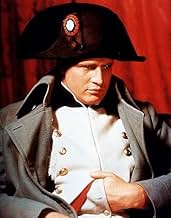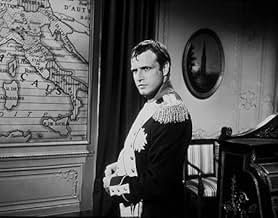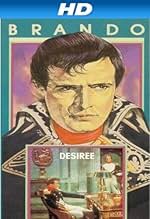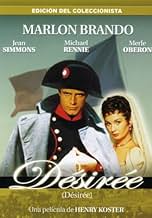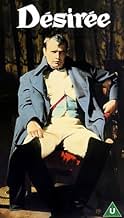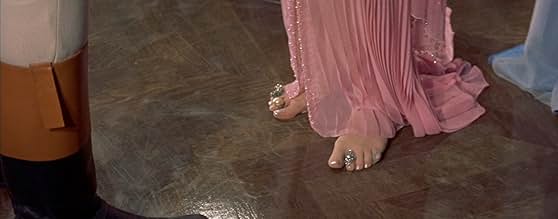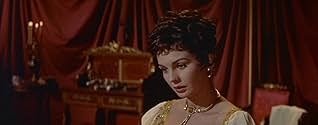Désirée
- 1954
- Tous publics
- 1h 50min
NOTE IMDb
6,4/10
3,8 k
MA NOTE
Ajouter une intrigue dans votre langueDesiree Clary falls for Napoleon but marries Bernadotte, while Josephine weds Napoleon to become Empress before being dismissed for not producing an heir.Desiree Clary falls for Napoleon but marries Bernadotte, while Josephine weds Napoleon to become Empress before being dismissed for not producing an heir.Desiree Clary falls for Napoleon but marries Bernadotte, while Josephine weds Napoleon to become Empress before being dismissed for not producing an heir.
- Réalisation
- Scénario
- Casting principal
- Nommé pour 2 Oscars
- 2 nominations au total
Leon Alton
- Party Guest
- (non crédité)
Louis Borel
- Baron Morner
- (non crédité)
Sven Hugo Borg
- Aide
- (non crédité)
Peter Bourne
- Count Brahe
- (non crédité)
Paul Bradley
- Party Guest
- (non crédité)
Avis à la une
This film is about Désirée Clary, a common French woman who was the one-time fiancée of Napolean and who later became queen of Norway and Sweden. She had a very remarkable life and it SHOULD have been an exciting film, though I found the movie to be very mannered and subdued...too subdued. As a result, it is not an especially exciting film...and it should have been. It follows her from her first meeting Napoleon and moves up through he ascending the thrones.
Désirée Clary is played by Jean Simmons, Napoleon by Marlon Brando and her husband by Michael Rennie. The film is also sumptuous to look at--with lovely sets and in full Cinemascope color. What it does not talk about at all are the marital infidelities by Napoleon, Josephine as well as Désirée's husband--all which could have made the movie much more interesting. So it's pretty but sanitized...and a bit dull because of this. It also just never sparked my interest at all and much of it is because the film is too episodic. Her life might better be told as a mini-series instead.
Désirée Clary is played by Jean Simmons, Napoleon by Marlon Brando and her husband by Michael Rennie. The film is also sumptuous to look at--with lovely sets and in full Cinemascope color. What it does not talk about at all are the marital infidelities by Napoleon, Josephine as well as Désirée's husband--all which could have made the movie much more interesting. So it's pretty but sanitized...and a bit dull because of this. It also just never sparked my interest at all and much of it is because the film is too episodic. Her life might better be told as a mini-series instead.
Recently I viewed for the umpteenth time CONQUEST with Charles Boyer's brilliant Oscar-nominated performance as Napoleon. I have just seen DESIREE for the first time and am intrigued by Brando's take on the man. The make-up department has given him a Napoleonic nose bridge and he has supplied the rest. He plays N. as a moody, passionate, obsessed man, but plays him in a quiet, controlled manner. Only twice in the film does he lose his temper. This is a performance I will go back to and study. Brando's insight is as always stellar. His Napoleon believed so much in his "destiny," that he assumed the rest of the world would fall into place around that obsession. Fascinatnig to watch.
The film itself is a pretty, early CinemaScope epic with Oscar-nominated Art Direction and Costume Design. Jean Simmons does her very best to bring this woman to life, but as others here have observed, Desiree was a rather dull child, noted for her beauty, and little else. That her life was a Cinderella story (from milliner to Queen of Sweden) is of no doubt, but she never seemed to have deserved her good fortune. It is really Brando's film. He has 19 scenes and makes the most of every one.
If you are a Brando or Napoleon fan, do see it, but don't expect much from the story. It's pretty straight-forward with little drama (though the circumstances make for much drama if written properly).
The film itself is a pretty, early CinemaScope epic with Oscar-nominated Art Direction and Costume Design. Jean Simmons does her very best to bring this woman to life, but as others here have observed, Desiree was a rather dull child, noted for her beauty, and little else. That her life was a Cinderella story (from milliner to Queen of Sweden) is of no doubt, but she never seemed to have deserved her good fortune. It is really Brando's film. He has 19 scenes and makes the most of every one.
If you are a Brando or Napoleon fan, do see it, but don't expect much from the story. It's pretty straight-forward with little drama (though the circumstances make for much drama if written properly).
I've never seen a Brando film before. I've never seen a Napoleon film before. But after studying Napoleon in World history class and seeing Desiree, I've come to the conclusion the Brando must be a descendant of Napoleon or something. He IS Napoleon. I wasn't that interested when my grandmother suggested it, but I don't take things at face value. I check it out. True it's not incredibly accurate, historically speaking, though a lot of it is true and someone certainly did their research. If I recall my history class correctly someone once called Napoleon "The greatest Godless man alive." or something like that. But Brando IS Napoleon. No Question.
Filmed when CinemaScope's original ratio was still in use by Twentieth's cinematographers and with production values ladled on with an apparently generous budget (though no authentic European locations), "Desiree" is somewhat of a disappointment in many respects. Surprisingly Merle Oberon, as Josephine, remains in my memory as giving a touching (and, of course, glamorous) performance, but virtually everyone else (including Jean Simmons, one of my special favorites) fails to impress. Perhaps the emphasis on recounting the exploits of Napoleon Bonaparte from the perspective of one of his early, and unrequited, romantic conquests is the reason the whole enterprise seems like an undistinguished piece of overstuffed furniture...comfortable but hardly worthy of praise as an artisan's finest achievement. As an entertainment, typical of the Fifties, it was worth the price of admission when first released but I rather doubt that I'll join a chorus requesting Fox Home Entertainment to give this a DVD release in a widescreen format.
The strange thing about this movie is that it really is what its title promises -- the story of Desiree, and nothing more. Made in the dark years before the feminist movement, (indeed, in the worst days of the feminine mystique) the film makers seem to assume that the "ideal" woman is warm, impulsive, kittenish, flirtatious and yet non-sexual. Desiree is forever stuck at the end of childhood. She lives through great events but her "womanly" nature makes her ignore everything but her own physical comfort. She is Scarlett O'Hara without the suffering, cruelty or ambition, and Natasha Rostov without the fellow-feeling, patriotism and mystical sympathy for others. It's odd how you feel enchanted by her, and yet you feel disgusted with yourself for wanting a girl who remains infantile in so many ways. Truly a guilty pleasure.
Some of the things Desiree says in this movie are beyond belief. For example, after she becomes Princess of Sweden, her husband suggests that she needs some tutors, and she cries, "I haven't learned anything since I was ten!" And like, who is supposed to stand up and cheer? You could be the worst sexist pig in the world and this movie would make you feel like Anna Quindlen.
Or take the scene where the Swedes arrive in the middle of the night and tell Marshall Bernadotte (a superb Michael Rennie) that he is now in line to be King of Sweden. Bernadotte tells Desiree, his wife, to hurry up and get dressed. "Put on anything, you understand?" And she wails, "no, no, I don't understand anything!" Some other comments have said Jean Simmons is "whining" in this movie. But it's much worse than that. She's really pure feminist Kryptonite! The whole point is that men find her irresistible because she always, always, plays dumb and does nothing but bleat about being hungry, tired, or confused.
Problem is, Jean Simmons is just so natural and so attractive that it sort of goes down easy. You really do find yourself wanting to hug her every other scene, if you're a man anyway. If you're Anna Quindlen you probably just want to slap her. She's the feminist anti-Christ.
At least she's not a blonde!
Some of the things Desiree says in this movie are beyond belief. For example, after she becomes Princess of Sweden, her husband suggests that she needs some tutors, and she cries, "I haven't learned anything since I was ten!" And like, who is supposed to stand up and cheer? You could be the worst sexist pig in the world and this movie would make you feel like Anna Quindlen.
Or take the scene where the Swedes arrive in the middle of the night and tell Marshall Bernadotte (a superb Michael Rennie) that he is now in line to be King of Sweden. Bernadotte tells Desiree, his wife, to hurry up and get dressed. "Put on anything, you understand?" And she wails, "no, no, I don't understand anything!" Some other comments have said Jean Simmons is "whining" in this movie. But it's much worse than that. She's really pure feminist Kryptonite! The whole point is that men find her irresistible because she always, always, plays dumb and does nothing but bleat about being hungry, tired, or confused.
Problem is, Jean Simmons is just so natural and so attractive that it sort of goes down easy. You really do find yourself wanting to hug her every other scene, if you're a man anyway. If you're Anna Quindlen you probably just want to slap her. She's the feminist anti-Christ.
At least she's not a blonde!
Le saviez-vous
- AnecdotesAlthough Marlon Brando didn't take his role seriously--despite every effort by director Henry Koster--"Desiree" outgrossed his other 1954 film, "Sur les quais... (1954)."
- GaffesNapoleon didn't conceive of the idea of attacking Italy. France had been fighting Austria in the War of the First Coalition since April 1792. France and Austria had armies facing each other in northern Italy. Napoleon was appointed to command the French army in Italy on March 1, 1794. he took command on the 26th and proceeded to inflict a series of defeats on the Austrian Army in the eastern Po River valley.
- Citations
Count Brahe: You will enjoy life in Sweden, madame. Stockholm is called the Venice of the north.
Desiree Clary: [Shivering] I prefer the Venice of the south!
- ConnexionsFeatured in Biography: Darryl F. Zanuck: 20th Century Filmmaker (1995)
Meilleurs choix
Connectez-vous pour évaluer et suivre la liste de favoris afin de recevoir des recommandations personnalisées
- How long is Désirée?Alimenté par Alexa
- Audrey Hepburn---Was She Suppose to Play Desiree?
Détails
- Date de sortie
- Pays d’origine
- Langues
- Aussi connu sous le nom de
- Desirée, la amante de Napoleón
- Lieux de tournage
- Château de Fontainebleau, Fontainebleau, Seine-et-Marne, France(location shooting)
- Société de production
- Voir plus de crédits d'entreprise sur IMDbPro
Box-office
- Budget
- 2 720 000 $US (estimé)
- Durée1 heure 50 minutes
- Couleur
- Rapport de forme
- 2.55 : 1
Contribuer à cette page
Suggérer une modification ou ajouter du contenu manquant



